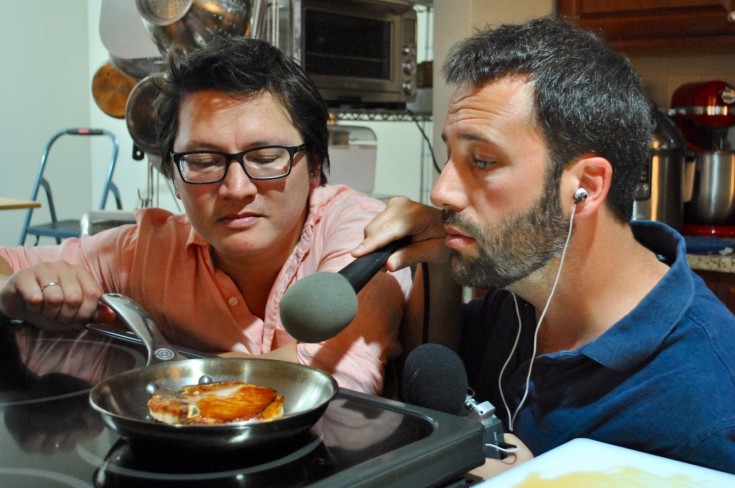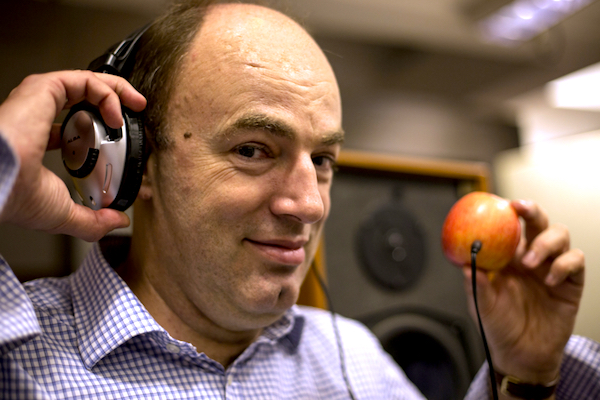
This week's episode of The Sporkful podcast is up! Listen through the player, Stitcher, or Apple Podcasts. (And please subscribe!)
In eating, sound is the forgotten sense.
Studies show that when one potato chip's crunch SOUNDS louder, we think that chip is better than others, even if they're actually all identical. And changing the background music can make chocolate taste sweeter or more bitter. (Scroll down to try that experiment yourself!)
This week on The Sporkful we're exploring how sound affects taste and what we can learn from listening to our food.
First up: food science guru Kenji Lopez-Alt (above, with Dan), author of The Food Lab: Better Home Cooking Through Science, takes us into the Serious Eats test kitchen to show us how you can tell if you're ruining your dinner -- just by the sounds you're making as you cook.
Kenji had to learn the hard way in his first fancy restaurant job when he was assigned to cut chives:
"The chef didn't even look at me -- she was like, 'you're cutting those wrong' and made me throw them all out," he recalls. "And the way she could tell was because of the sound they make."
But you can learn the easy way -- by listening to the episode. Kenji has the low down on how to cut scallions, make homemade mayo, and sear a pork chop -- by ear.
Later in the show, we learn that sound also matters when you're eating.
Madre Chocolate's Nat Bletter (an ethnobotanist by training) explains that you can tell a chocolate's quality by the sound it makes when you break it.
And Charles Spence (below), an experimental psychologist at Oxford University, joins Dan to conduct another experiment with sound and chocolate.
Dr. Spence is the researcher who discovered that when you amplify the sound of a potato chip’s crunch, people think it’s a better chip. He has devoted his career to studying the many factors that contribute to our perception of taste.
Follow the steps below to try Dr. Spence's chocolate experiment for yourself at home -- and be sure to let us know if you get the same results.
1) Get some dark chocolate.
2) Take a bite and keep the chocolate in your mouth and don’t chew it -- treat it like a sucking candy.
3) Hit play on this clip:
When that music kicked in, did your chocolate taste more sweet or more bitter?
4) Still got your chocolate in your mouth? Now listen to this:
How did that second clip affect the sweetness or bitterness of the chocolate?
When Dan tried that experiment with Dr. Spence, that first clip made his chocolate taste more bitter; the second, higher pitched music made it taste more sweet.
Listen in to the full episode to hear Dr. Spence's explanation of what's happening in your brain in that experiment with chocolate and music.
Plus, what kind of chocolate eater are you -- a chomper or a melter? (Or a cho-melter??)
Interstitial music in this episode from Black Label Music:
- "Midnight Grind" by Cullen Fitzpatrick
- "Stay For The Summer" by William Van De Crommert
- "Quirk Store" by Nicholas Rod
- "Can You Dig It" by Cullen Fitzpatrick
- "Child Knows Best" by Jack Ventimiglia
- "Happy Jackson" by Kenneth J. Brahmstedt
Photos: Anne Noyes Saini and courtesy of Charles Spence



